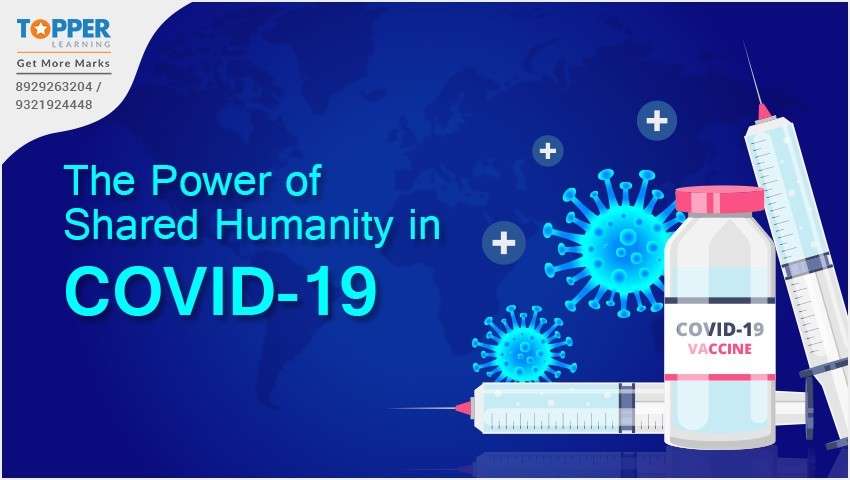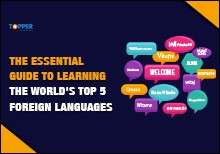The Power of Shared Humanity in COVID-19

The pandemic has altered people’s lives in both enormous and small ways. The blog discusses Covid-19, a severe respiratory illness caused by a novel virus, its symptoms, health issues, prevention methods, and the Impact Of Covid pandemic on Humanity.
By Topperlearning Expert 14th Jul, 2023 | 04:35 pm
ShareWhat exactly is a Coronavirus?
Coronaviruses are a vast family of viruses that cause respiratory diseases in humans and animals worldwide. Coronaviruses are known to infect both people and animals. The first human Coronavirus was identified in 1960. The novel Coronavirus, commonly known as SARS CoV-2, is a newly emerged coronavirus that has never been found before. This virus led to outbreaks of COVID-19 disease, which causes respiratory disorders in people. The new Coronavirus is zoonotic, which may transfer easily from animals to people. People affected by the COVID-19 pandemic caused by the novel Coronavirus have mild to moderate respiratory symptoms that resolve independently. However, the COVID-19 disease has a negative impact on the aged, the vulnerable, and persons with other medical issues. People who have heart disease, diabetes, chronic respiratory disorders, or cancer are at a higher risk of developing serious illnesses.
How Coronavirus Spreads?
The COVID-19 pandemic is primarily disseminated through saliva or droplets discharged from the nose when an infected individual coughs or sneezes. People infected with the COVID-19 disease may have few or many infections. People who have been infected with a low virus load may experience minor symptoms or none at all. People who are infected with a high infection load get severe symptoms that can be dangerous.
The Impact of Covid-19 on India
The COVID-19 pandemic has revealed the healthcare system's flaws. This virus has harmed people's access to primary health care. It has drawn attention to the absence of health infrastructure in terms of doctors, medical equipment, hospitals, and health workers regarding availability and accessibility. The Covid-19 pandemic affected the majority of daily wage labourers or workers in industries and factories, leaving them unemployed and dramatically increasing the unemployment rate.
The country's economic growth has slowed as a result of industry closures. Because of the Covid-19 pandemic, most schools and educational institutions have been affected. Learning has moved online.
Symptoms of Covid 19
- The most common symptoms include fever, cough, tiredness and loss of taste or smell. Other symptoms that are not common include headache, diarrhoea, and red or itchy eyes. Also, some serious symptoms include difficulty breathing, loss of speech, smell and taste and chest pain.
Testing Strategies
There are two kinds of testing done. First, molecular diagnostic testing (RT-PCR) aids in identifying those who are infected at the time of the test.
A second form of test, known as a serologic test, finds those who have already been infected and thus developed antibodies.
Prevention of COVID 19
- The outbreak of this virus can be avoided by following social distancing and hygiene.
- Try not to shake hands or get too near to anyone.
- When you go out, use a high-quality mask and hand gloves.
- Sanitisers should be used regularly.
- Consume food after thoroughly cleansing it.
- Regularly monitor your body temperature and respiratory symptoms.
To watch video click here.
An SMS a day keeps COVID away. Yes. SMS stands for Sanitization, Masking and Social Distancing. Keep washing your hands at regular intervals and use alcohol-based hand sanitiser. Also, wear proper masks certified by the Health Department and cover your mouth and nose. Do not forget to maintain distance when in public places.
Quarantine
The quarantine prevents Covid-19 transmission by isolating those who have had any contact with someone infected with the virus from the rest of the community.
Who needs to be quarantined?
- If you have had close contact with someone infected with SARS-CoV-2, the virus that causes COVID-19, in a way that increases your risk of infection.
- If you have symptoms such as a cold, fever, or body ache.
Process of Quarantine
- For at least five days, stay at home and away from people.
- When you are at home, use a well-fitting mask.
- For at least ten days after your last close contact with someone who has COVID-19, watch out for fever (100.4°F or higher), cough, shortness of breath, or other COVID-19 symptoms.
- If you have symptoms, get tested immediately and isolate yourself until your findings arrive. If you test positive, you should keep yourself isolated.
- If you test negative for COVID-19, you must wear a well-fitting mask in public and at home for at least ten days after your last close contact with someone infected with the virus.
Corona Warriors
Throughout this epidemic, everyone who supported each other in need sacrificed their lives for others' well-being. They were named "Corona warriors".
Doctors, nurses, ward boys, pathologists and chemists were on duty to assist patients in recovering from this deadly infection. They were always willing to put their lives into helping others. The police personnel were at the forefront of providing essential services. Many people began assisting lost and wandering labourers to reach their destinations by providing food and shelter.
Vaccines for COVID 19
Developing safe and effective COVID-19 vaccines was crucial in helping us return to doing more things we enjoy with the people we love. Since the start of 2021, India developed two indigenous vaccines by Bharat Biotech and Serum Institute of India – COVAXIN and COVISHIELD.
Vaccines act by imitating infectious agents, such as viruses, bacteria, or other microbes, that might cause disease. This 'teaches' our immune system to respond quickly and efficiently to it.
Myths and Misconceptions on COVID 19
According to World Health Organisation, some myths and misconceptions must be checked for and observed. Also, some myth-busters will make people more aware of the deadly virus.
Myth Busters
- The virus exclusively affects the elderly and children and spares the young.
- People should neglect their pets because the infection is communicated through them.
- Mouthwash, antibiotics, cigarettes, and alcohol are all potentially lethal.
- Taking a steam bath outside in the sun will help you from becoming infected with the Coronavirus. All food items are tainted and will spread the Coronavirus.
- There is no need to be concerned because Indians have stronger immune systems and are more vulnerable to infections than those in Western countries.
- Corona virus does not live in hot conditions.
- Always use trustworthy sources of information validated by the Ministry of Health and Family Welfare of the Government of India.
Impact of COVID-19 Pandemic on Humanity (Psychological Support for Children)
During this pandemic, it is common for students to feel pressured and overwhelmed. Quality time is both free and enjoyable. It will make you feel safe and loved. Feeling stressed, anxious, bereaved, and afraid during a pandemic like COVID-19 is normal. Fear and concern for your health and loved ones can be overpowering and result in powerful emotions. Information and news posted on social media and other platforms may not always be accurate, producing uncertainty, anxiety, and tension.
Some signs make anxiety during this pandemic, such as nightmares, difficulty in sleeping and eating, being withdrawn or aggressive, having fears and being left alone.
Positive Environmental Impact
Because of the state-wide lockdown, 1.3 billion individuals avoided polluting activities. As a result, the environment was spared pollution, the sky stayed clear, pure air was gained, and river systems were also cleaned. The Ganga and Yamuna rivers, whose purity is always a problem, have benefited much from this effort in cleaning this system.
Conclusion
I hope you enjoyed reading this blog and learned something about COVID-19. This pandemic has shown us how interconnected the entire world is. Humanity will suffer greatly if we do not work together and cooperate. Kids need to be taught the concept of COVID-19 in detail to know the disease's severity and how it has affected our economy. At Topperlearning, an online Learning Website, we want to help kids be ready for these concepts to understand by teaching them about COVID-19 according to the NEP 2020 plan. So, let us start teaching them about the deadly virus, the CORONAVIRUS.
FAQs
Q 1. Can Covid-19 be transmitted through mosquitoes?
Ans: There is no evidence that the novel Coronavirus can be transmitted through mosquitoes. The virus can be spread through droplets from coughing, sneezing or a patient's saliva.
Q 2. Can digital thermometers be 100% effective in detecting Covid-19 patients?
Ans: It may take the virus 1-14 days to incubate and cause symptoms like fever, so digital thermometers cannot be used to identify asymptomatic patients.
Q 3. Can the virus that causes COVID-19 be transmitted through the air?
Ans: Studies to date suggest that the virus that causes COVID-19 is mainly transmitted through contact with respiratory droplets rather than through the air.
Q 4. Can I catch COVID-19 from my pet?
Ans: No. There is no evidence that companion animals or pets such as cats and dogs have been infected or could spread the virus that causes COVID-19.
Q 5. Where can I get the vaccine from?
Ans: Vaccines are available from Government and Private Health Facilities as notified, known as COVID Vaccination Centres (CVCs).
Q 6. Which COVID-19 vaccines are licensed in India?
Ans: Two vaccines that have been granted emergency use authorisation by the Central Drugs Standard Control Organization (CDSCO) in India are Covishield (AstraZeneca's vaccine manufactured by Serum Institute of India) and Covaxin (manufactured by Bharat Biotech Limited).
Q 7. How important is education on COVID-19?
Ans: By learning more about COVID-19, you can avoid infection and stay healthy, as well as understand how the pandemic affects the world at large.
Q 8. What will students learn about Coronavirus?
Ans: Students will learn about the details of the spread of the disease and its treatment and carry out any research-related options to solve a critical problem that has yet to be a concern.
Q 9. What is CBSE Skill Education, and what are the books and support materials available for it?
Ans: As per NEP 2020, the Central Board of Secondary Education (CBSE) introduced skill-based education in schools. The aim is to equip students with practical skills to help them in their careers. CBSE has published a range of books and support materials for this purpose, covering various subjects such as Retail, Information Technology, Beauty and Wellness, and more. Topperlearning strives to raiseawareness about the significance of such in-demand skills and topics throughthis blog series.
ICSE Class 10 Specimen Papers Uploaded for 2024 - Check New type of Questions and Paper Pattern Changes
Important Resources
- Education Franchisee opportunity
- NCERT Solution
- CBSE Class 9 Mathematics
- NCERT Solutions for class 10 Science
- Sample Papers
- CBSE Class 9 Science
- NCERT Solutions for class 10 Maths
- Revision Notes
- CBSE Class 10 Hindi
- CBSE Class 10 English
- CBSE Class 10 English
- CBSE Class 10 Social Studies
- CBSE Class 10 Science
- CBSE Class 10 Mathematics
- Career In Science After 10
- Career In Commerce After 10
- Career In Humanities/Arts After 10
- NCERT Solutions for Class 10
- NCERT Solutions for Class 11
- Business Studies Class 12 CBSE project





